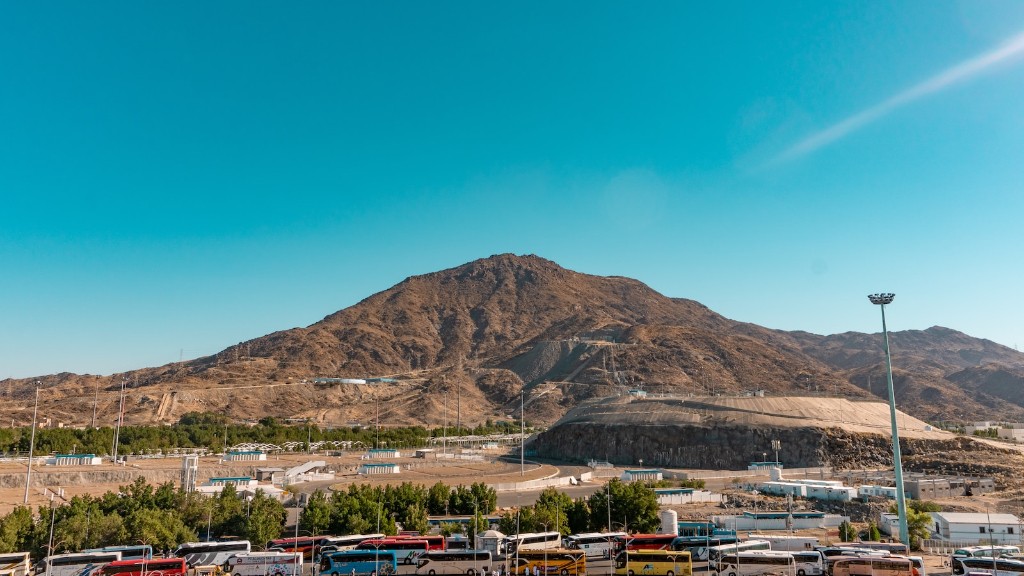Saudi Arabia, an Arab country located in the Middle East on the coast of the Red Sea, has a rich past and an historic relationship with WWII, though its role was not as big or influential as that of many other countries in conflict around the world. It did, however, play an important role in supporting the Allied cause through the provision of oil resources, equipment and materials.
In terms of physical presence, though, the involvement of Saudi Arabia in the war effort was actually quite limited. Although its ports and airfields were used as staging points by Britain for operations in Egypt and Iraq, there was no Saudi military presence on actual battlefields. The small expeditionary force that King ‘Abd al-Aziz set up during the war, known as the Desert Defence Force, was merely ceremonial, and there were no Saudi forces actively involved in ground fighting.
The major role that Saudi Arabia played in WWII was the wealth of resources – particularly oil – which it supplied to the Allies via Aramco (the Arabian American Oil Company). In large part, these resources allowed Britain and the United States to mount their successful offensives in the Middle East and North Africa, though the Kingdom was originally hesitant to provide supporting supplies due to the international dominance of Great Britain and France.
However, following Ibn Saud’s visit to the United States in 1943 and the establishment of a trade agreement with the Americans, Saudi Arabia became much more generous in its offerings – even allowing the British to open a naval base in Jubail. Indeed, the Kingdom proved to be a valuable partner in supplying the Allies with much needed fuel and equipment.
Saudi Arabia was also notable for its outboard support services such as medical aid and the award of decorations to members of the Allied forces. Prince Sultan (son of Ibn Saud) was decorated with the Distinguished Service Order from Britain, and the Legion of Merit from the United States. Similarly, the King was awarded a number of American citations for his material aid.
The history of Saudi Arabia is much more complicated than can be summed up in a few paragraphs, and certainly its role in WWII is one to be viewed in the context of the whole war effort. It is clear, however, that whilst its direct involvement in the fighting itself was quite limited, it played an invaluable role in providing supplies, resources and logistics in the complex stage of global war.
Economic Assistance
While Saudi Arabia may have provided material assistance to the allied forces during World War II, it also provided a vital economic assistant for those affected by the war. For instance, the Saudi government provided subsidies and loans to those affected by the war, in addition to capital assistance and industrial training. Much of this assistance came from Crown Prince ‘Abd al-‘Aziz bin Abd al-Rahman Al Saud, who allocated funds from his personal finances and established factories as part of his efforts to create jobs for Saudi citizens.
In addition, the Saudi government donated to a wide range of charities to support those who had been affected by the war. These donations ranged from educational funds and scholarships to medical supplies and food for those in need, and went a long way in helping to support the civilian population of the country.
It is clear, then, that while the direct involvement of Saudi Arabia in the conflict of World War II was limited, it nonetheless provided invaluable economic assistance during this difficult period. By providing subsidies and loans, industrial training, and much-needed humanitarian aid, Saudi Arabia proved to be an important partner to the Allied forces during the conflict.
Rise of Nationalism
The involvement of Saudi Arabia in WWII also marked a shift in the country’s attitudes towards international affairs. Prior to this point, the country had been relatively isolated in terms of its foreign policy and interactions with other states. The global conflict, however, saw the emergence of Saudi nationalism and a call for increased involvement on the world stage.
This was exemplified in the speech given by King ‘Abd al-‘Aziz (later “Ibn Saud”) at the Cairo Conference of 1943, in which he declared that the Arabs should no longer remain passive in world affairs, but rather fight for their independence and to shape their own destinies. This speech signalled a major shift in Saudi Arabia’s relationship with the West.
In addition, Saudi Arabia began to take an active interest in other Arab countries, as evidenced by its support of the Hashemite monarchy in Transjordan (now Jordan). The support for the Hashemites allowed Ibn Saud to gain influence in the region and to begin to influence its policies, and this was a major step forward for Saudi Arabia in terms of its foreign policy objectives.
The involvement of Saudi Arabia in WWII, then, was much more than mere provision of resources or logistic support – it served as a catalyst for the country’s move towards regional and international engagement.
Ideological Changes
Alongside the rise of Saudi nationalism, meaning the emergence of an independent Saudi identity, this period of history also saw the emergence of an ideology of moderation within the Kingdom. In contrast to the past, those involved in the conflict’s discussions and negotiations held a more moderate and accommodating stance, seeking to reconcile differences and reach compromises between competing countries. This provided the basis for the development of a strong sense of Saudi “identity”, and a national pride and sense of purpose similar to that of other countries affected by WWII.
At a political level, this ideology led to the creation of the Council of Crown Princes in 1945, which was established by Ibn Saud and provided a platform for the discussion of controversial political and social topics. The council provided a means of communication and compromise between different stakeholders, and proved to be an effective tool for resolving disputes.
The emergence of this new ideology in Saudi Arabia was also accompanied by a greater openness towards the West and its ideals. These included the promotion of education, modernisation, and economic development, in addition to the fostering of positive relationships between the East and West. This attitude laid the foundations for Saudi Arabia’s later emergence and world economic and political power.
Diplomatic Presence
One very significant development during this period was the establishment of diplomatic relations between Saudi Arabia and the United States. In recognition of the Kingdom’s support for the Allied cause during WWII, in 1946 President Truman appointed Harold Horace Prescott as the first American Ambassador to Saudi Arabia. This was of huge historical importance, not just for Saudi Arabia but for the entire region.
Moreover, the presence of an American Ambassador also had a long-term effect on the politics of the Middle East. It signaled the beginning of a much more active American involvement in the region and opened the door to strong diplomatic ties between Saudi Arabia and the West. This in turn led to the establishment of a broad range of diplomatic ties between Saudi Arabia and many other countries, from the United Kingdom and Japan to China and Australia.
It is clear, therefore, that the presence of an American Ambassador in Saudi Arabia following WWII was highly significant. It allowed the Americans to strengthen and expand their influence in the region, and laid the groundwork for many strong links between the Kingdom of Saudi Arabia and its leading Western allies.
Conclusion of Hostilities
The end of the war also saw a significant transformation in the Kingdom of Saudi Arabia. The Allied victory provided an opportunity to create a new world order, and Ibn Saud used this opportunity to build on the foundations that had been established during the conflict. This included a dramatic expansion and modernisation of the Kingdom’s government and economy, facilitated by increased oil exports. Ibn Saud also launched a series of diplomatic initiatives aimed at creating new international linkages, both political and economic, and established a strong diplomatic presence for the Kingdom of Saudi Arabia in the international community.
Moreover, the end of WWII also resulted in a political and ideological landscape much different to that which had existed prior to the war. As a result, Saudi Arabia was in a much stronger position in terms of its ability to influence regional and international affairs. The development of diplomatic ties with the United States, and the establishment of a strong relationship between the two countries, were major factors in this transformation.
Thus, while Saudi Arabia may not have played a major role in the global conflict of WWII, it nonetheless proved to be an important and influential partner to the Allied cause. Its far-reaching economic, ideological, and diplomatic impact transformed the Kingdom’s role in the international arena, and provided a platform for its much greater influence in the decades that followed.





